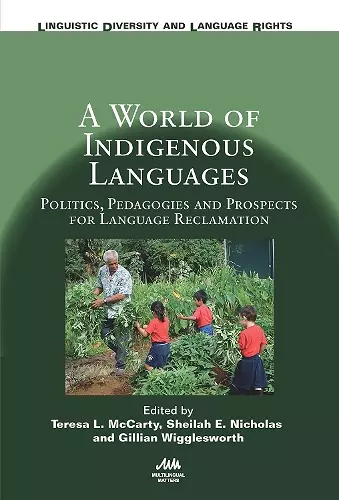A World of Indigenous Languages
Politics, Pedagogies and Prospects for Language Reclamation
Teresa L McCarty editor Sheilah E Nicholas editor Gillian Wigglesworth editor
Format:Paperback
Publisher:Multilingual Matters
Published:13th Mar '19
Should be back in stock very soon
This paperback is available in another edition too:
- Hardback£114.95(9781788923064)

New insights into the vitalities and challenges of Indigenous language reclamation in diverse contexts around the world
Spanning Indigenous settings across six continents, this book examines the multifaceted language reclamation work underway by Indigenous peoples worldwide. The authors foreground Indigenous knowledges and perspectives, highlighting the decolonizing and liberatory aims of contemporary Indigenous language movements inside and outside of schools.
Spanning Indigenous settings in Africa, the Americas, Aotearoa/New Zealand, Australia, Central Asia and the Nordic countries, this book examines the multifaceted language reclamation work underway by Indigenous peoples throughout the world. Exploring political, historical, ideological, and pedagogical issues, the book foregrounds the decolonizing aims of contemporary Indigenous language movements inside and outside of schools. Many authors explore language reclamation in their own communities. Together, the authors call for expanded discourses on language planning and policy that embrace Indigenous ways of knowing and forefront grassroots language reclamation efforts as a force for Indigenous sovereignty, social justice, and self-determination. This volume will be of interest to scholars, educators and students in applied linguistics, Ethnic/Indigenous Studies, education, second language acquisition, and comparative-international education, and to a broader audience of language educators, revitalizers and policymakers.
This collection of international voices and perspectives – speaking about and in Māori, Ojibwe, Aanaar Saami, Hopi, Limbu, Ngaanyatjarra, Quechua, and Nahuatl, among others – powerfully works for the reclamation of Indigenous languages and the resilience of Indigenous peoples. The authors and editors provide transformative visions of Indigenous futures for Indigenous languages.
* K. Tsianina Lomawaima, Arizona State University, USA *It is utterly refreshing to read a book exclusively dedicated to Indigenous world languages with each chapter written or co-written by an Indigenous author. Equally invigorating is the authors' common value for and focus on language reclamation movements as they are situated in policies and politics, pedagogy, and Indigenous futures.
* Tiffany S. Lee, University of New Mexico, USA *This work is a remarkable source of inspiration and encouragement to anyone engaged in Indigenous language reclamation efforts, showing ways to tackle some of the most challenging problems in this context. The book ought to be disseminated through university libraries, community centers and other spaces where Indigenous community members, activists, scholars and others can access it easily.
* Leena Huss, Uppsala University, Sweden *This volume is international in scope and includes and impressive range of voices and perspectives on Indigenous language reclamation...[it] contains many examples of strength-based research. Indigenous knowledges and systems are not over-explained; instead they are positioned as legitimate and valuable.
-- Belinda Daniels, University of Saskatchewan, Canada and Andrea Sterzuk, University of Regina, Canada * Journal of Immersion and Content-Based Language Education 8:1 *Altogether, the ten experiences showcased in this volume provide a thought provoking synopsis of current initiatives of Indigenous language reclamation movements, the outcomes of their “linguistic-educational-political-survival work” and a notion of their transformative potential for Indigenous peoples and the world [...] This book will be of particular interest to those who seek a better understanding of language practices within Indigenous communities, to those exploring innovative strategies for Indigenous language maintenance and learning, and to those concerned with prioritising language reclamation as a practice of Indigenous self-(re) empowerment and self-determination.
-- Ulrike Hanemann, UNESCO Institute for Lifelong Learning * International Review of Education (2020) 66 *I strongly recommend this book as a thorough, uncompromising overview of the topic, ideal for undergraduate or graduate classes in anthropology, linguistics, or Indigenous studies.
-- Sarah Shulist, Queen’s University, Canada * Native American and Indigenous Studies, 2020 *The socioeconomic impacts of capitalism and the lingering effects of colonialism on indigenous communities and their language use are addressed throughout all ten chapters, providing an historically informed snapshot of contemporary language reclamation issues and efforts. This collection will surely be of interest to anyone engaged with language reclamation, whether as an indigenous community member or as a nonindigenous collaborator.
-- Kelly Baur, Arizona State University, USA * Language in Society 50 (2021) *We have no doubt that this volume, as a ‘testimony to contemporary Indigenous language movement and its transformative potential’ (p. xviii), will be an impactful publication that has a lasting influence on the ongoing efforts to reclaim indigenous languages worldwide.
-- Yadong Guo, Tongji University, China and Xuesong (Andy) Gao, University of New South Wales, Australia * Language Policy (2021)ISBN: 9781788923057
Dimensions: 234mm x 156mm x 14mm
Weight: 410g
264 pages